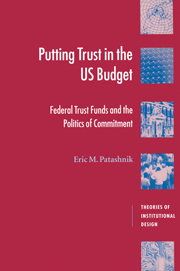Book contents
- Frontmatter
- Contents
- List of figures
- List of tables
- Preface
- 1 Introduction: trust funds and the politics of commitment
- 2 Political transaction costs, feedback effects, and policy credibility
- 3 Trust fund taxes vs. general fund taxes
- 4 Social Security
- 5 Medicare
- 6 Highways
- 7 Airports
- 8 Superfund
- 9 Barriers to trust fund adoption: the failed cases of energy security and lead abatement
- 10 Conclusions: the structure and normative challenges of promise-keeping
- Bibliography
- Index
8 - Superfund
Published online by Cambridge University Press: 22 September 2009
- Frontmatter
- Contents
- List of figures
- List of tables
- Preface
- 1 Introduction: trust funds and the politics of commitment
- 2 Political transaction costs, feedback effects, and policy credibility
- 3 Trust fund taxes vs. general fund taxes
- 4 Social Security
- 5 Medicare
- 6 Highways
- 7 Airports
- 8 Superfund
- 9 Barriers to trust fund adoption: the failed cases of energy security and lead abatement
- 10 Conclusions: the structure and normative challenges of promise-keeping
- Bibliography
- Index
Summary
The very nature of environmental policymaking makes crafting durable policy commitments challenging. While the benefits of environmental policies are often long-term and diffused, the costs may be immediate and concentrated on influential interests. Hence the initial passage of a major new environmental program in the United States often requires some perceived scandal or “crisis.” If environmental policies are difficult to enact they may be even harder to sustain. Industry opponents will constantly be on the lookout for opportunities to reverse preexisting arrangements. Environmental activists thus have their work cut out for them. Yet while these conditions are constraining, the Superfund case shows how strategic advocates can use fiscal design to enhance the political durability of an environmental program.
Established in December 1980 by a lame-duck Democratic Congress and a lame-duck Democratic President (Jimmy Carter) following the shocking discovery of a leaking toxic waste dump in the suburb of Love Canal, New York, the Superfund Trust Fund pays for cleanup of abandoned hazardous waste sites primarily from taxes on the chemical and petroleum industries. The underlying premise of Superfund's design is that if the true cost of cleaning up the nation's hazardous waste sites were made explicit to voters, the political commitment to completing the job would be weaker and less secure.
The key to strengthening this commitment, policy entrepreneurs at the Environmental Protection Agency believed, was sheltering the program from budgetary competition and minimizing its need for general tax revenues. This was accomplished in two steps.
- Type
- Chapter
- Information
- Putting Trust in the US BudgetFederal Trust Funds and the Politics of Commitment, pp. 154 - 172Publisher: Cambridge University PressPrint publication year: 2000



